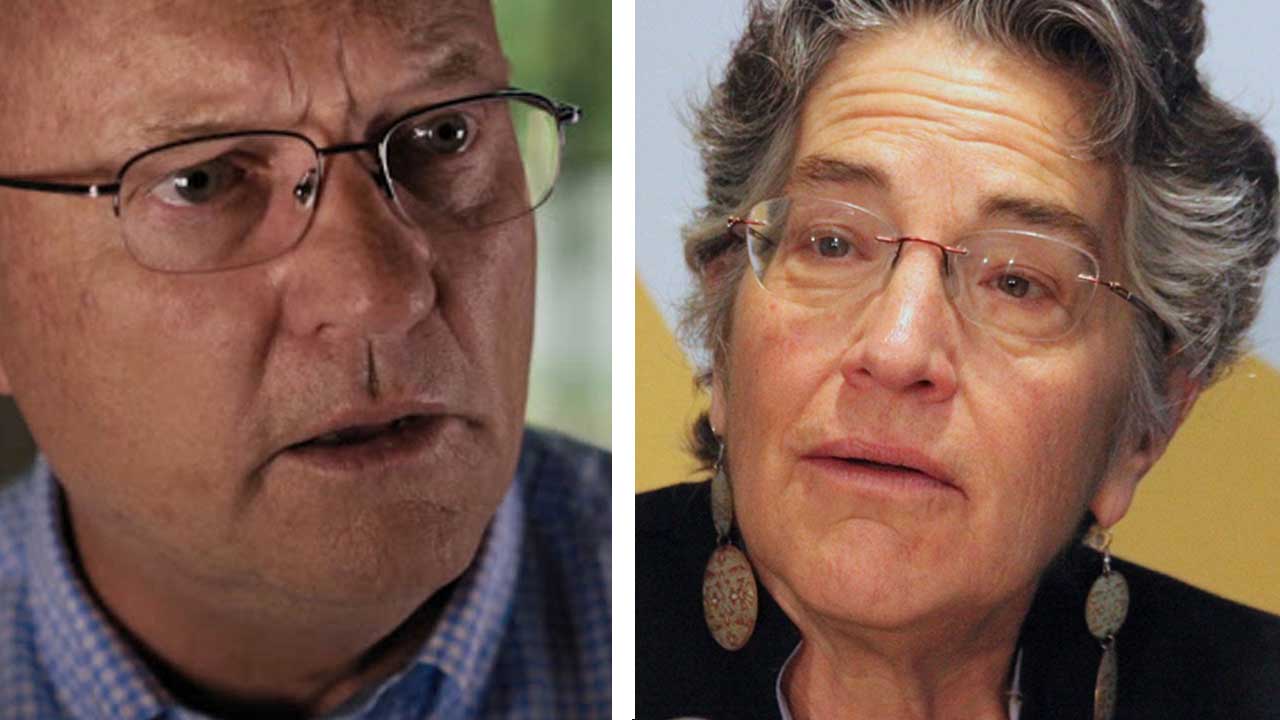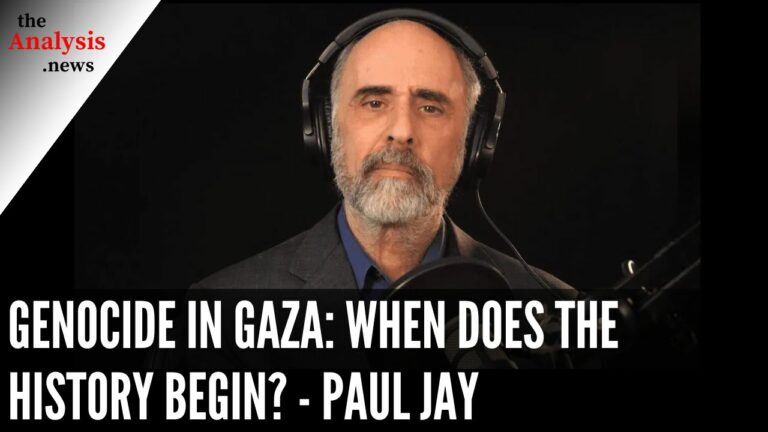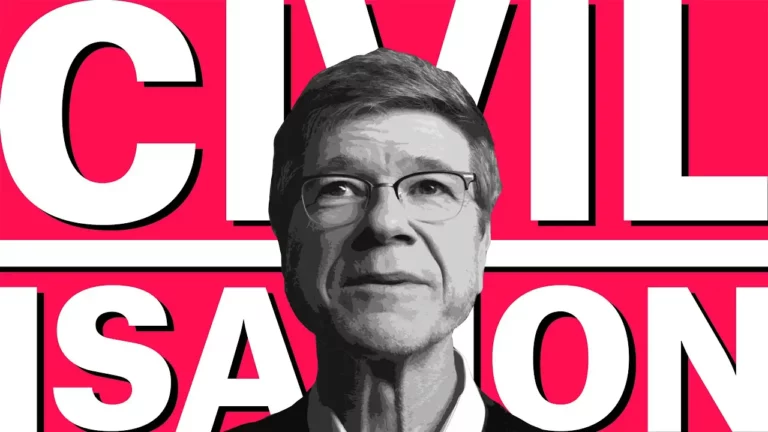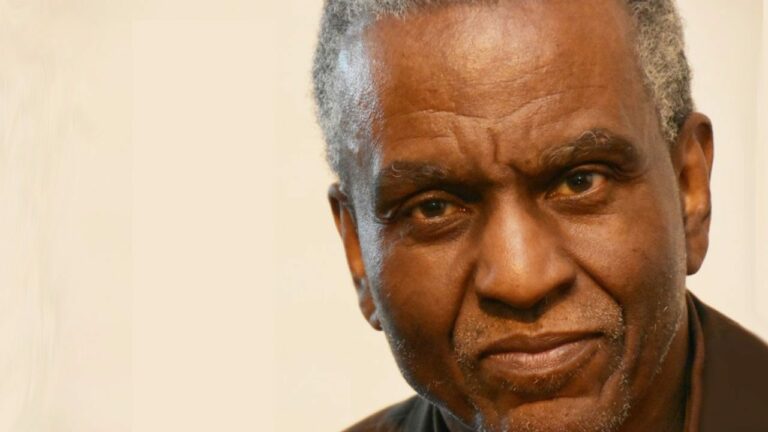Where is Biden’s Foreign Policy Headed? – Phyllis Bennis and Larry Wilkerson
Biden has appointed many old guard interventionists and new Cold Warriors, but there is some hope for a better Iran policy. Watch out for attempts by Israel to scuttle the nuclear deal. A wide-ranging discussion with Phyllis Bennis and Larry Wilkerson on theAnalysis.news with Paul Jay.
Transcript
Paul Jay
Hi, welcome to theAnalysis.news podcast. I’m Paul Jay. Please don’t forget there’s a donate button at the top of the webpage.
The Biden foreign policy team is now in place and based on their confirmation hearings and interviews and history, we can tell more about the direction of U.S. foreign policy. Anthony Blinken, the new U.S. Secretary of State, was questioned by Lindsey Graham during his confirmation hearing and it was somewhat of a “lovin” which is somewhat disturbing to me, at least. Jake Sullivan, the new national security adviser, has advocated, quote, a less ambitious foreign policy for the middle class.
So, are the interventionists back or have they learned the lessons of their failures? Now, no doubt Biden and his team all believe that what’s good for the American empire is good for Americans. I don’t think there’s anyone who questions that underlying assumption, which, of course, they should, but that’s not going to happen. That said, there are differences in foreign and military policy ranks, and the differences matter. My guests today are going to discuss what we know so far and just what to make of Biden’s promise of fresh thinking in foreign policy.
So joining us, Phyllis Bennis is the director of the New Internationalism Project at the Institute for Policy Studies and one of her latest books are Understanding ISIS and the New Global War on Terror: A Primer as well as the just-published seventh updated edition of her popular Understanding the Israeli-Palestine Conflict (https://www.interlinkbooks.com/product/understanding-the-palestinian-israeli-conflict-2/). Thanks for joining us, Phyllis.
Phyllis Bennis
Great to be with you, Paul.
Paul Jay
And also joining us is Lawrence Wilkerson. He’s a retired United States Army colonel, former chief of staff to United States Secretary of State Colin Powell. Thanks very much for joining me.
Lawrence Wilkerson
Good to be with you, Paul.
Paul Jay
So let’s start with Iran. And here’s a little back and forth between Lindsey Graham and Anthony Blinken.
excerpt from Blinken’s confirmation hearing (1/19/21)
Lindsey Graham
“Do you still consider Iran the largest state sponsor of terrorism?”
Antony Blinken
“I do.”
Lindsey Graham
“I think that if the Iranians had a nuclear weapon. They would use it. I think the ayatollah is a religious Nazi. Would you agree to at least talk to me and Senator Menendez about an alternative to the JCPOA when it comes to Iran.”
Antony Blinken
“I welcome talking to both of you and members of the committee about the way forward on Iran.”
Paul Jay
So, Phyllis, what’s your reaction to that exchange? And where do you think the Biden administration is on going forward on the agreement with Iran?
Phyllis Bennis
Well, first of all, I think that we can’t look at the question of Iran or even the question of Biden foreign policy separate from looking at the political moment where we are. It is very important because I think that in other arenas, most particularly when we look at climate and immigration and somewhat racial justice and economic justice, we’re seeing a real recognition in the Biden administration that it was the left-wing, the progressive wing of the Democratic Party that put them in office.
They were elected largely by black women. That’s what made it possible for them to win this election. And in that context, they’re showing a real shift in policy. Now, we also know that the gap between the Biden wing and the progressive wing is the biggest on the question of foreign policy. So our expectations are not the same for the extraordinary things we’ve seen in recent days around canceling the XL pipeline, supporting DACA (Deferred Action for Childhood Arrivals), ending funding for the wall on the border, ending the Muslim ban, supporting the extension of the New START treaty even.
All of these things have gone forward and they’re very very important. The question of foreign policy and the question specifically of Iran within that have to be looked at, I think, with that in mind. Now, having said that, I think that there is some good news and some bad news on the question of Iran policy. I think there’s little doubt that Biden really wants to claim the Iran nuclear deal, the JCPOA (Joint Comprehensive Plan of Action) as part of his own legacy.
This was, Obama’s, arguably his most important diplomatic success, and Biden was part of it. And he’s going to want to claim it for his administration now going forward. What’s not so clear is how much political capital is he going to be willing to spend to make that happen in a scenario where the four years of Trump meant that not only was the U.S. pulling out of the nuclear deal, but it was imposing dramatic, horrifying new sanctions on Iran that led to, among other things, the death of children by malnutrition, something that was unprecedented in modern Iranian history.
So, there has got to be some acknowledgement of that. There’s going to have to be some kind of agreement on both sides to come back into compliance together. The positions that were taken at the confirmation hearings, not only by Blinken but by the others as well, was quite disturbing when they all said with more or less the same language, some of the things that you just played. But also they said when they were asked originally, do you support going back to the Iran nuclear deal, they all said, yes, we support going back to the nuclear deal, but not until Iran is back in compliance as if the U.S. had already been in compliance, which, of course, it has not been.
So that’s slightly unnerving. The good news is, I think the appointment number one of Wendy Sherman as the number two at the State Department because she was the main person who negotiated the Iran nuclear deal under the Obama administration. She knows the Iranian diplomats. She knows what the pressures are on them in terms of their election that’s coming up in June, et cetera. And even more important than that, I think, was the selection just in the last 24 hours or so of Rob Malley, who’s currently the director of the International Crisis Group, as the main Iran envoy for the Biden administration.
This took a certain amount of political capital to be spent because the attacks on the Biden administration for even considering appointing Rob Malley were vicious. They were based on lies. And they were showing all signs of getting even stronger: attacks by the Israel lobby, attacks by the right-wing anti-diplomacy contingent, both in the Democratic Party and the Republican Party and all those who opposed the Iran nuclear deal who are legion in Congress.
Paul Jay
What’s his history? Why are they so out for him?
Phyllis Bennis
His history is twofold. He was one of the lead diplomats on the team under Wendy Sherman, who negotiated the Iran nuclear deal. And he’s known as somebody who has a, what I suppose now is considered a rather old fashioned view of diplomacy, which means that you have to actually talk to the other side to find out what is motivating them, what their needs are, what they can negotiate on and what they really can’t.
Paul Jay
Very backward.
Phyllis Bennis
The other thing is he was part of President Clinton’s team on Israel Palestine, and he was one of the ones who went public after the failure of the Camp David efforts to say that what a surprise it was not solely Yasser Arafat’s fault that those talks failed. And he has since that time been accused falsely of being anti-Israel, soft on Iran, soft on terror, soft on Hamas. Any sort of accusation along those lines you can imagine has been tossed at Rob Malley.
So, in the last several days when his name was being circulated as a possible head of the team to negotiate with the Iranians, there was enormous opposition. And the fact that Biden said, I’m not going to listen to that opposition, I’m going to appoint the person I think will do the best job. I found that quite reassuring.
Paul Jay
Larry go ahead.
Lawrence Wilkerson
I pick up on one of the things that Phyllis said there, and I don’t want to be a downer on this, because I hope she’s right. But the Democrats have promised black Americans for ages and have not delivered. Many of my black friends who voted for Donald Trump, too many of them, in my estimation, voted for him for that very reason, because they were sick and tired of the Democrats not living up to their promises when black voters have consistently given them their vote.
Well, I hope Phyllis is right. I hope that these aren’t just initial moves to make it look like they’re going to be more susceptible to pressure from these groups when in fact, over time they won’t be. On Iran, the situation I think is extremely challenging right now, even for someone like Rob Malley and some of the other people that are going to be involved. It’s that way because Pompeo and others left so many landmines lying along the streets.
The sanctions are the most formidable of those landmines. They sanctioned red ants in Iran. They sanctioned the needs of locusts. So, unwinding those is going to be unbelievably difficult. I know. I had to participate in some efforts to do that through OFAC (Office of Foreign Assets Control) and others when I was at State. And it’s bad enough what was already there, but what’s there now is going to be just incredible. And the Iranians are going to ask, their quid pro quo is going to be OK, we can come back into compliance rather swiftly. And I read a report from the IAEA today. They probably can.
Then they’re going to want that sanctions relief and it’s just going to be so difficult to do it. So I hope this team is, I know they’re aware of it, I hope they’re already working on the intricacies of this because it is incredibly complex and it takes time.
So that’s my biggest concern. I think Phyllis is right. I think they’re going to go after it whole hog. They’re going to try to do everything they can to get back into the agreement. It was the singular diplomatic accomplishment of both Biden and Obama, and they want to bring it back and more power to them as far as I’m concerned. But it is going to be extremely difficult to give the Iranians what they will want, absolutely want, in order to get back into it.
The other thing that bothers me about this situation immediately staring me right in the face. You may have read Gareth Porter’s piece (https://thegrayzone.com/2021/01/25/biden-administrations-coercive-iran-regional-crisis/). General F Mackenzie Jr. is a power broker. He is craving more amphibious ready groups, more carrier battle groups, more submarines. Every time I turn around, he’s doing something really stupid, like putting a submarine in the Persian Gulf.
Paul Jay
Who’s General Mackenzie?
Lawrence Wilkerson
He’s the commander of the now huge and most important in terms of power, Unified Command Plan (UCP), Central Command. And by the way, did you know Israel’s now in the command? President Trump signed off on a change to the UCP, putting Israel – something we in the military had said verboten, do not do that, we will never do that because it just brings so much baggage with it – now, it is under U.S. Central Command, which gives General Mackenzie planning authority and warfighting authority with regard to Israel and vice versa.
This is not a good move is almost as bad as when we created Africa Command. So, I’m worried about that. Every time a carrier wants to go home, it’s been out there too long. It doesn’t need to be there in the first place. It doesn’t go home. Mackenzie calls it back. And as I said, he put submarines in the Persian Gulf. You could destroy a submarine with a single magnetic mine. The water is so shallow there, the water so restrictive, active and passive sonar doesn’t work well. The principal defenses of a submarine. So, he’s a dangerous man, in my view. And Gareth got it. Gareth called it out in an article yesterday or the day before.
Paul Jay
Phyllis, there was a senior Israeli military commander just a couple of days ago who was saying if the Americans do try to get back into the agreement, Israel shouldn’t keep military action off the table. I don’t know if it’s bluster as part of this, trying to pressure Biden, but one, it seems very significant that Biden didn’t succumb to the pressure from what you’re saying. And are the Israelis at all serious about trying to provoke something unilaterally?
Phyllis Bennis
Well, this certainly wouldn’t be the first time if they did. I think that it is partly bluster, but we can’t ever assume that it’s only bluster when it comes to Israel. Israel is widely blamed for the assassination just in the last few weeks of a top Iranian nuclear scientist, this follows almost exactly a year after the U.S. assassination of General Soleimani, the leading both political and military leader in Iran, who was very much a hero for people in Iran, ordinary people, as well as within the elites in Iran.
And so far, Iran has not responded in a military way to that. How long that restraint will continue is an open question. If Israel decided that it was prepared to use whether it was direct military force. What’s more likely would be another assassination, a cyber attack, something else, in a way that would force Iran’s hands, that would force Iran politically to respond in a more dramatic way. They certainly have the capacity to prevent the possibility of renegotiation at this stage.
It’s a very dangerous moment. And it’s one of the things when we look back at the history of the Iran nuclear deal, it’s one of those things that should have been easy, right? The White House wanted this. Peace activists wanted this. A large number of members of Congress wanted this. But there were members of Congress who didn’t want it, who want to go to war against Iran and Israel didn’t want it. I think people will remember back in 2015, when the Republicans invited Bibi Netanyahu, the Prime Minister of Israel, to come and address a joint session of Congress as if it was his house, as if it was his State of the Union address, something that brought about an unprecedented result, which was that more than 60 members of Congress skipped the speech, that had never happened before.
The vast majority of them, frankly, were not people who were concerned about Israel’s oppression against the Palestinians. They were members of the Black Caucus who were outraged at Netanyahu’s racism in how he dealt with President Obama. But the result was the same 60 members of Congress skipping the speech of the Israeli Prime Minister had never happened before. So, the possibility that Israel plays a major role in thwarting a return to the nuclear deal should be something that we have to be very, very cautious about.
It absolutely could happen. And it will take a lot of exposes ahead of time and mobilization ahead of time to make clear that this should not be allowed to go forward.
Paul Jay
And, Larry, the other country that vigorously wants the agreement not to go ahead is Saudi Arabia. Now, Biden had committed to not support the Yemen war and to withdraw. You know, I don’t know if it meant economic or military support. Where are we at on this? Is the Biden administration actually taking some moves towards backing off at least support for Saudi Arabia in Yemen?
Lawrence Wilkerson
I think they’re going to seriously feel out the Congress before they do that. And I assume they’re doing that right now. That doesn’t necessarily mean you have to go over there and do a confirmation hearing. You can do some other things too to feel out the Congress. So, I think that’s probably what they’re doing right now. I don’t think MBS (Mohammed bin Salman) is in the same boat he was in a year or two ago. I’m appalled at how rapidly we’ve all forgotten the brutal murder of Jamal Khashoggi.
But we have from Tim Kaine to Bob Menendez, you know, so pontificating about it earlier, it seems to have just gone away. But at the same time, I think the royals have done some things to keep a little better eye on MBS, a little better check on him. That has also attenuated some of his eagerness to do things. The recent rapprochement, so to speak, with Qatar is a case in point. So, I don’t think they’re as eager to do that as Israel is.
That doesn’t mean, as Phyllis just intimated, that Israel won’t think up something or do something. And I’m more worried about that particular thing happening now, since the Israeli military, particularly its leadership, seems to be in sync with Netanyahu, whereas in the past when we were negotiating the JCPOA, you may recall, we had intel chiefs, we had retired and active duty intel Mossad, we had IDF retired and active duty, all whispering in the prime minister’s ear that they were in favor of the JCPOA, not against it.
We even had some of them speaking out in that regard. So, it’s a little bit more dicey situation right now. Plus, Netanyahu is looking at going to jail perhaps himself and his wife along with him. So, I’m really worried about that. I’m as worried about that as I am Taiwan right now. And what Israel might do that would just, you know, we’re in for a penny in for a pound when it comes to Israel.
Phyllis Bennis
I agree with most of what you said, Larry, but I think that it’s also true that we’ve seen some indications from the Biden administration already that they are serious, both about the ending of direct support to the Yemen war, which was voted on by Congress, both houses of Congress passed legislation calling for an end to the sharing of intel, the targeting information that the U.S. was providing. It also mentioned what has already been stalled, but could be renewed, which is the U.S. involvement in providing in-air refueling to Saudi airplanes, which meant that they could be much more efficient at bombing funerals and wedding parties, and other civilian targets because they had U.S. planes providing fuel while they were in the air.
That was vetoed by Trump, and Biden has made clear that he would not veto it if it came back to his desk, which I think it will because I think the bipartisan votes for it will still be there in Congress. What we also saw, though, is a move to put at least a temporary pause on the two big arms deals that were just made with Saudi Arabia and the UAE.
For the UAE, it’s a huge deal for 50 F-35 fighter bombers, this is the plane that the Pentagon keeps saying they don’t even want, but Boeing keeps producing them, so they have to be sold to other countries. It’s hundreds of millions of dollars in that deal. And then the deal for Saudi Arabia is for very advanced bombings that allow very clear, supposedly very clear targeting. But again, in the Yemen war, they will be used again, and they have been used in ways that create huge numbers of civilian casualties. Both of those deals are now stalled. They’re now going to be re-evaluated by the Biden administration.
They haven’t said that they’re going to stop them permanently, but they’ve indicated that that might be a possibility. And I think that right now, I think you’re right, Larry, that at the level of the press and some in Congress, the issue of Khashoggi’s killing and what the Saudis have done in Yemen, which is responsible for huge numbers of people dying in this horrific war, what the UN calls the worst humanitarian catastrophe now underway in the entire world.
It’s also true that a number of members of Congress have remembered it and have taken this up in a much more serious way. And there’s a host of reasons why, after just a two-year campaign for the first time, we did see Congress voting to stop U.S. support for the Saudis. That had never happened before either. And it has to do partly with the level of humanitarian catastrophe. It also has to do with the Khashoggi killing. It has to do with MBS and his relationship to the Trump administration, particularly to Jared Kushner.
And very frankly, it has something to do with anti-Arab racism. It’s easier for members of Congress to come out against Saudi Arabia, even though it’s been a longtime ally because they’re Arabs. If this was Israel in the same position, we would not see the same result. But we are seeing it now, and I’m a little bit optimistic that that momentum is going to continue.
Paul Jay
OK, Larry.
Lawrence Wilkerson
I spent two years on the Hill lobbying for that legislation, everyone from Mike Lee to Bernie Sanders. And I can tell you right now that the present situation in the Congress might be such that you might not get that bipartisan support anymore, even from someone like Mike Lee. So, while I am with you on their efforts to do this, I see this as a political ploy, a stall here, a stall there. Selling armaments here, not selling armaments there to bring political pressure to bear so that they can eventually, I hope, get a deal. But I don’t. Call me a pessimist. After two years of lobbying for that legislation and seeing it passed and then vetoed by the president and seeing how slimly it passed, even with that and knowing that Nancy Pelosi and Steny Hoyer and a host of other stalwart Democrats were our biggest opponents makes me a pessimist.
Phyllis Bennis
Pessimism is always useful in these situations. But the moment is early yet, so I’m holding on to my little bit of optimism. I’m hopeful.
Paul Jay
One of the things that Graham and he gets Blinken to agree that Iran is the greatest state sponsor of terror. I mean, this is ridiculous. I don’t even know what any example is. Just because Iran supports Hamas and Hezbollah, that makes them a state sponsor of terrorism.
Lawrence Wilkerson
That’s it Paul. They support terrorist groups that are specifically aimed at and will not attack you, you American, or you German, or anybody else if you don’t interfere with their operations.
That’s been clear in the intelligence community for years now. Hezbollah is the number one terrorist group in the world in terms of capability. But if you don’t bother them in their domain, they won’t bother you. Why? Because they’re focused on Israel?
Phyllis Bennis
I think we have to be very careful about who we call a terrorist group. Hamas was elected in a flawed but real election and has as much or as little support as the other main political party in the Palestinian territories.
Not much. But they run a municipality, if you will. They don’t have much power to do so, but they don’t carry out a whole lot of military attacks. Hezbollah has carried out what I would consider terrorist attacks because there have been a few attacks on civilians. But they emerged in the context of fighting against the Israeli invasion and occupation of southern Lebanon in 1982. And they are also the most popular voting bloc in the Lebanese parliament. So I just think Larry, we have to be really careful talking about what’s a terrorist group and who does Hamas sorry, who does…
Lawrence Wilkerson
Phyllis, I think the United States of America is a terrorist group when it drops F-16 bombs on kids.
Phyllis Bennis
I would agree with that as well. But I just think that it’s too easy to kind of dismiss, particularly because Iran actually stopped supporting Hamas, which it used to support. But it has lots of disagreements with Hamas. So, it doesn’t anymore. It does still support Hezbollah, but Hezbollah is far more than a military or militant organization.
Lawrence Wilkerson
My point was simply that the reason we say what we say on both sides of the political aisle about Iran being a sponsor of terrorism is because of Israel. It doesn’t really have much to do with terrorism, it has to do with Israel.
Phyllis Bennis
I agree with that.
Lawrence Wilkerson
And when you look at Saudi Arabia, in my view, I mean, they don’t have the population Iran does. So, Lindsey, did you mean population? Saudi Arabia is the biggest state sponsor of terrorism on the face of the earth. It’s awesome what they’re still doing. And, you know, Lindsey, I’m sorry, but, you know, this has become the thing that Democrats and Republicans say, especially in public, in order to satisfy the idea that Iran is a threat, they have to satisfy that idea. So they have to throw that out there. Look at their ballistic missiles. What are they for? Defense. Look at Saudi Arabia, 80 billion dollar’s worth of U.S. armaments every time you turn around.
What does Iran have? Iran doesn’t have an aviation capacity. That’s significant because we don’t give them the repair parts. We don’t let them get things. We sanction them. So, they got their ballistic missiles. They lived through remember the Iran-Iraq war in the last few years. There was a war of missiles. I hit your city, you hit my city, back and forth. That’s the only thing they have. So, we talk about these other things, support of terrorism, ballistic missiles, and they’re outrageous trying to take territory in the region and so forth.
Iran could not beat Iraq in eight years of one of the bloodiest wars in history. We beat Iraq in 19 days. And Iran is a threat. Iran is a terrible threat. This is what bothers me as a military professional. It is not a threat in any significant sense unless you attack it and then it’s a terrible threat.
Paul Jay
So, Phyllis, what does it tell us about Blinken that he agrees with this formulation that Iran is the greatest terrorist state and all the rest.
Phyllis Bennis
I think we have to be a little careful about what judgments we make about what somebody says at their confirmation hearings. Everything that anybody asks that they can agree with, they’re going to agree with. Now, do I think that Tony Blinken agrees with that? He may. He may, but we haven’t seen him act on that sort of thing in the past. He’s not somebody who has fought against the U.S. so-called Global War on Terror. He has not been a great opponent of the war in Iraq.
He hasn’t been a great opponent of the war in Yemen. And I wish that Biden had appointed somebody who was those things. But I do think that we’re at the early stage of this administration and I come back to the notion that I think the one thing that’s different about this administration is that they are operating in a different political moment when they have to take seriously a wing of their own party and a set of social movements out there in the world that are making demands that they can’t afford for their own political viability.
They can’t afford to simply dismiss. So I’m not prepared to say that I’m going to hold Blinken accountable right now for believing X, Y or Z, because he answered yes to a provocative question. Do I wish he had made it something more questionable, that he had questioned it and said, actually congressman, actually senator, I think that we have to talk about that in a whole different way. Yes, I wish he had done that. But I don’t think that the fact that he said yes necessarily proves what his actual strategic goal would be.
I come back to who have they appointed to these other top positions, the two key people who negotiated the Iran nuclear deal the first time around. So, I’m sticking to that as the optimism here. It may be wrong. It may not be enough. It may be that he means every word of it. When he said yes, that’s exactly what I believe. He said the words, yes, I wish he hadn’t.
Lawrence Wilkerson
I agree with Phyllis too, but I will say this. It used to just rile me to no end when Obama would say those sorts of things and he would say them because of the other side of the political aisle and also because of people, as I indicated earlier, in his own party, because you’ve got to say Iran is a threat. We’re in this business, in this empire of saying people are threats rather than saying they’re enemies, competitors, or whatever, and we need to deal with them and talk with them and negotiate and so on.
We like to see them as threats. And that’s a dangerous way to approach the world, as I think we’ve seen over the last 20 years.
Paul Jay
Well, I’ll give something to three of the Biden people if you want a little glimmer, to join the glimmer of Phyllis’s optimism club. Avril Haines, Jacob Sullivan, and even Blinken clearly, and two of the three of them referenced this as a directive from Biden are using the word competitor rather than adversary over China, and that’s a glimmer of some optimism too, because it’s pretty easy to keep using adversary and enemy, and they’ve chosen not to do that. OK, a final question.
Lawrence Wilkerson
That’s the word we used in the Bush administration: strategic competitor. Go back and check.
Phyllis Bennis
Because we had another enemy to fight in those days.
Lawrence Wilkerson
Yeah, true.
Paul Jay
Yeah, Larry, and then to you Phyllis, the same question, which is, there was an interesting exchange between Rand Paul and Blinken where Rand Paul, who, in my personal opinion, is pretty much a nutcase on so many issues and on the far-right, gave a very good, I thought, denunciation of the kind of interventionism that’s gone on in U.S. foreign policy. And he kind of challenged Blinken on Libya, on Syria, and I didn’t hear from Blinken any, quote-unquote, fresh thinking, or have we learned any lessons from this. The people that Biden has appointed were very much part of this quite aggressive policy under Obama. Do you think they’ve learned a lesson or too soon to say?
Lawrence Wilkerson
I hope so, I don’t see how anyone who thinks critically at all cannot have learned some sort of lessons. I know President Obama did because as I told you that day in the Roosevelt Room when he sat across from me with John Kerry right beside him and said there’s a bias in this town toward war, Libya had taught him that. And some of the people around him had taught him that, most notably Samantha Powers and a few others, Hillary Clinton, for example, who just come back and changed her mind and joined in with the warmongers that put him into Libya.
And I think he thought that was the greatest mistake of his second term, if not both terms. So, I think they have to have learned something. The question for me is, what has the Congress learned and what will the Congress compel them to do one way or another when it comes to something that is in the Congress’s interest? Because what is the Congress now? It is a wholly owned subsidiary of the military-industrial-you name-it-complex.
And that’s how it gets its money. That’s how it gets re-elected. That’s how it makes the whole system work nowadays. And when I say and everything else in it, I’m talking about universities. I’m talking about think tanks. I’m talking about this thing that Eisenhower said would pervade every office place. It would even go down to every home and heart. That’s where it is now. And it’s powerful and it’s very influential. We were looking at something yesterday that Powell tried to do in 1994.
This makes so much sense. But it was being done then, principally because he had told President Bush, H.W. Bush, he was going to give him a peace dividend and we were looking for ways to do it. We were going to turn one of the nation’s principal shipbuilders now, warship builders, Bath Iron Works (BIW) into a facility and they were willing, Maine was willing, Bath was willing, that would make high-speed rail engines, high-speed rail components, the rails themselves, would make windmills and their blades and so forth, would do all manner of things for a new, resilient, sustainable infrastructure.
What happened? Along came Grumman bought them up and now they’re making warships still, they never transitioned. That was a really powerful moment when we could have captured more of that and we didn’t. This is a hugely powerful bunch of people and they dictate policy. Look at where they are most successful right now.
General McKenzie’s Central Command, that’s where we have the largest air force base in the world. That’s where we have the largest troop reception facility in the world, bases in Qatar, the reception facilities in Kuwait, we have the second largest in Saudi Arabia, a military city, we have the largest naval fleet in Bahrain, the Fifth Fleet. Its assets are incredible now compared to the others. We’ve made that place, the fiefdom of the empire, war. All because people are making tons and tons of money off of it.
Paul Jay
Phyllis, you want a last word?
Phyllis Bennis
Everything Larry just said is absolutely true. And it’s true that a lot more people in and out of Congress are now talking about the need for a just transition for people in the military who want to get out, who don’t want to be part of that system anymore for people in military production who need jobs when we transition out of these military deployments.
The call to cut half the military budget, half the military budget of seven hundred and forty billion dollars, $350 fifty billion, that’s almost half, goes directly to military contractors and military corporations. So, all of that is now being talked about in far more public ways than it used to be. It’s all still true, but there are new possibilities now because social movements are demanding it. It’s not only a peace movement that is not strong enough to make these demands.
It’s the movement for racial justice that’s demanding an end to the militarization of communities as well as the militarization of U.S. foreign policy. It’s the climate justice movement that is saying we have to transition to a green economy, and part of that means shutting down some or all of the eight hundred military bases around the world. It’s talking about cutting the military budget. There’s a resolution in Congress that didn’t pass that called for just a 10 percent cut to the military budget.
But it was the first time anyone had ever even tried to get that on the agenda. 10 percent is nothing. That’s chump change. But 10 percent of seven hundred and forty billion dollars, that’s more than the entire war budget within that Pentagon budget of seven hundred forty billion. So we’re talking about new possibilities here that all depend on what our movements are capable of. I’ll come back to an end with this notion of the political moment that the Biden administration finds itself in.
It finds itself in a moment when social movements are more powerful than ever, where more people in this country are starting to recognize because of the pandemic what this incredible divide between rich and poor has brought to this country. What white supremacy has meant in this country. People who never understood that before suddenly are starting to get it. And that means that some of those people are the people who voted for this president and for this administration. It doesn’t guarantee anything.
We need new, bold ideas. And most of the people that Biden is appointing for foreign policy are not new or bold. They are old and experienced and tired. But there are a few exceptions that we have to hold on to. And there’s a whole world out here of social movements to hold them accountable to something different, to say if we can’t do it as a result of what has happened from this pandemic and the economic crisis that it created, and the aftermath of these wars we have been waging for two decades now, in ways that have made us less safe and responsible for deaths all over the world, that’s made us hated in whole new ways all over the world because of this, then we won’t have the chance. But I think we’re going to have the chance because I think our movements have learned those lessons. Even if Congress hasn’t and even if the White House hasn’t, they’re not going to do anything on their own. We’re going to have to force them to do it. But I think we’re better prepared than ever to make that happen.
Paul Jay
That’s good. Thanks very much, Phyllis. Thank you, Larry. Thank you. And thank you for joining us on theAnalysis.news podcast. Please don’t forget the donate button.
Podcast: Play in new window | Download







Bennis and Wilkerson are excellent.
I would suggest that economic collapse is closer than many think possible.
If so, then economic collapse may force attention away from war.
It will force serious financial attention towards America itself and away from funding the American war machine.
Can the Empire continue its obscene drain on American resources and continue its absurd advance across the globe?